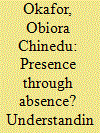| Srl | Item |
| 1 |
ID:
178006


|
|
|
|
|
| Summary/Abstract |
This study examines the African Human Rights Action Plan (AHRAP) through the lens of Upendra Baxi's germinal theory on the emergence in our time of a ‘trade-related, market-friendly human rights’ (TREMF) thesis that is challenging the specific understandings of ‘people-centric’ human rights that are predicated in the letter and spirit of the Universal Declaration of Human Rights (UDH). Baxi contends, instead, that the dominant strands of the contemporary understandings of human rights are – for the most part – designed to protect the interests of global capital. That said, human rights frameworks in low-income countries need to be studied with a view to what they say and don't say about global capital. Despite its attempt to facilitate a progressive realisation of human rights in Africa, the AHRAP does not rise far enough above the TREMF paradigm to re-locate itself within the UDH one. This is due to the AHRAP not adequately theorising and analysing the role of capital in the (non)realisation of human rights in Africa. By allowing trade and market practices to slip to a significant extent beyond its purview, the AHRAP privileges – to a significant degree – the needs/interests of capital over the human rights of ordinary Africans. That is, the victims of the excesses of capital in Africa are reincarnated in the AHRAP document by the fact of their exclusion from it.
|
|
|
|
|
|
|
|
|
|
|
|
|
|
|
|
| 2 |
ID:
171294


|
|
|
|
|
| Summary/Abstract |
Deepak Unnikrishnan’s debut text, Temporary People, attempts to explore certain vulnerabilities and anxieties of transience that accompany emigrants to the Gulf Cooperation Council countries, where citizenship is not an option. By representing one of the largest Gulf diaspora in contemporary history—the Keralan emigrants or pravasis—as spectral figures and as absence-presences that signal a non-present presence in the Gulf, Unnikrishnan’s book attempts to retrieve and register their occulted histories on the Gulf landscape. In particular, this article explores how, by creating a Keralan Gulf-pravasi spectre, Unnikrishnan critically engages with a more varied version of Gulf diasporic experience and, therefore, a more complex definition of emigration itself.
|
|
|
|
|
|
|
|
|
|
|
|
|
|
|
|
| 3 |
ID:
188988


|
|
|
|
|
| Summary/Abstract |
The role of silence has received increasing attention in International Relations, ranging from silence as exclusion to secrecy and performance. Yet, there has been little effort to draw together a more practical, methodological inquiry into silence and how to engage with it in the research processes. This article builds on existing studies on silence and our own research experiences in conducting interviews and text analysis to interrogate the role silence plays in the research process. It aims to develop methodological tools for engaging with silence and offers a practical guide to analysing it from the data generation stage to the interpretation of silence. In doing so, it also contributes to attempts to redefine the meaning of silence in International Relations by including silence as more than an absence.
|
|
|
|
|
|
|
|
|
|
|
|
|
|
|
|